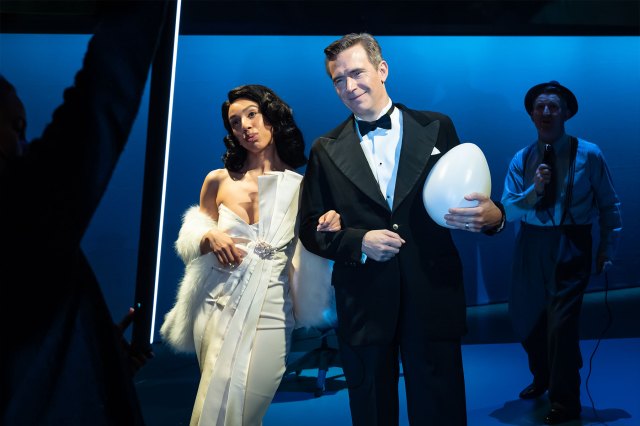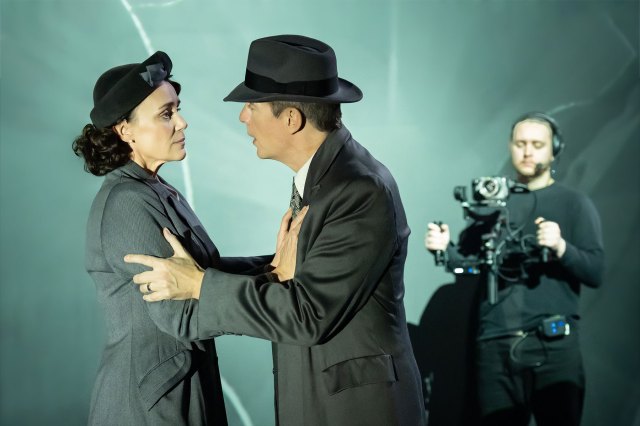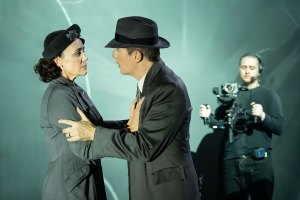The Human Body review – Keeley Hawes and Jack Davenport at the dawn of the NHS
Lucy Kirkwood’s play has its world premiere at the Donmar Warehouse

“The past is a foreign country: they do things differently there.” One of the many merits of Lucy Kirkwood’s new play about love, politics and the conflict between desire and duty is to remind us of the truth of L P Hartley’s dictum as she paints a vivid picture of the mixture of privation and idealism in post-war Britain that produced the NHS.
Set in the period immediately leading up to its birth on 5 July 1948, it centres on a terrific Keeley Hawes as Iris Elcock, a harassed GP who juggles her roles as a Labour councillor, working to steer the new health service into being, and a home life as housewife and mother with a wounded war veteran husband and a demanding daughter obsessed with Princess Elizabeth’s wedding dress.
In Michael Longhurst and Ann Yee’s deliberately stylised production, we first see her in a live version of a Pathé newsreel, floating around Fly Davis’s clever monochrome set – all blacks, greys and blue furniture – as the perfect embodiment of the modern woman, shopping basket over her arm as she sets out to conquer the world.
A screen overheard captures her image and her clipped vowels in close-up. Throughout the action, Ben and Max Ringham’s sound design (slightly muffled from where I was sitting) and Nathan Amzi and Joe Ransom’s videos create an air of fluid artificiality, surrounding what happens on an ever-revolving stage with a black and white screen image of it, brought into being by a hard-working and beautifully drilled stage crew.

When Jack Davenport’s movie star George Blythe arrives, he brings his own camera, so that his ensuing affair with Iris is played out in life and on celluloid, their own version of Brief Encounter unfolding as they are irresistibly drawn to one another despite their contrasting characters.
He has avoided the war in Hollywood playing rotters, cads and bounders. “Apparently I am very credible as a moral vacuum.” He likens her passionate socialism, her desire for a better society, to broccoli – “you promise righteousness, but no pleasure. You are green and unknown and overboiled” – and warns that “you can’t scold grown men and women into eating broccoli when ice cream is available”.
He says this in the single best scene, in a restaurant with grey soup, where the conflicting visions the characters represent of a technicolour world full of enjoyment and a black and white vision of sacrifice for the sake of the general good suddenly come into sharp focus. Elsewhere, the play sometimes bites off more than it can chew, sprawling off into political points and sub plots that don’t quite land, despite the best efforts both of the astonishing Tom Goodman-Hill, Siobhán Redmond, Pearl Mackie, and (in this performance) Flora Jacoby Richardson, who play many parts with supreme ease.

But Kirkwood is such a wonderful writer and Longhurst (in his last production of his tenure as artistic director) and Yee such confident, fluent co-directors that the occasional bagginess doesn’t matter. It’s impossible not to admire the ambition of the play, the way it reaches into the past both to show how everything has changed, and how much remains the same when it comes to asking the rich and privileged to give up what they have to build a better world for the impoverished. It looks to the future too; when Iris tries to explain to her daughter that it’s unfair that Princess Elizabeth was given extra clothing coupons for her wedding dress when others aren’t, the youngster simply replies, “Does it matter?”, an expression of how far the idealism of postwar politics has vanished for the next generation.
The performances are a joy. Davenport is wonderfully urbane and just a little sad, entirely convincing as a man who has relied on charm to shield him from the intrusive troubles of life. And Hawes is superb, inhabiting Iris with a little jut of a defiant chin, capturing both her desire to make the world a better place and her increasingly bothered sense that her own life is built on a series of compromises. It’s a subtle wonder at the centre of an engrossing play.















